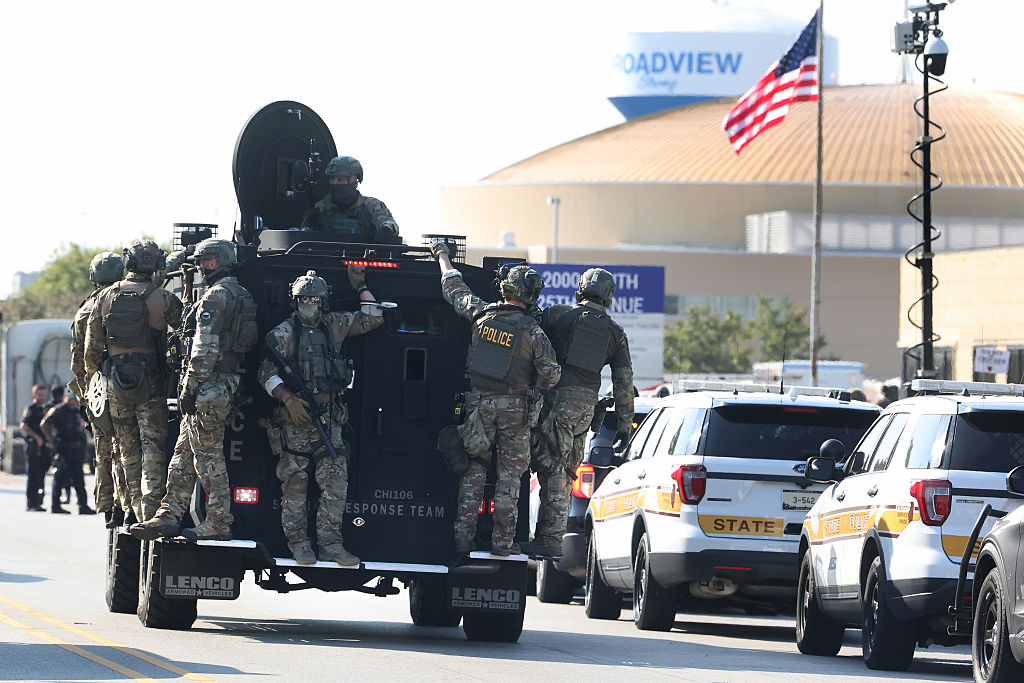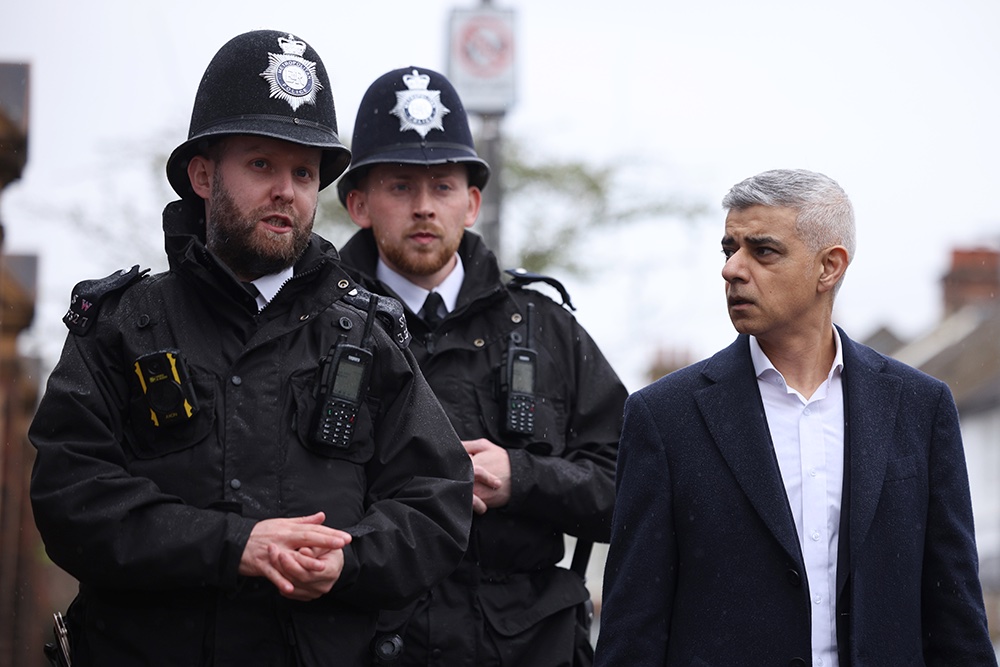Philadelphia will choose its next mayor tomorrow. The election isn’t until November, but Republicans don’t stand a chance in the City of Brotherly Love these days. So tomorrow’s Democratic primary is all that matters.
In this big-city race, crime and public safety has dominated the campaign, pitting moderate Democrats against progressives. If you feel like you’ve read that sentence before, it’s because you probably have, in relation to any number of major US cities in the last three years.
Since 2020, America’s metropolises have been the scene of blue-on-blue political fights over the interlocking issues of crime, homelessness, public order, criminal justice and Covid restrictions. They dominated the race that gave New York mayor Eric Adams, the ex-cop who styled himself as a crime fighter but, more than a year into the job, hasn’t made much headway. In San Francisco, hyper-liberal prosecutor Chesa Boudin was recalled in what was seen as a sign of things to come for a progressive prosecutor movement that had missed its moment. More recently, in Washington, DC, the federal government intervened to side with the mayor in a fight over the district’s criminal code and a council proposal to take a softer approach to the very crimes that have spiked in recent years.
The 30,000 ft-view looks clear enough: across the country, progressives overshot on criminal justice, the voters revolted and city leaders tacked to the center. Calls to defund the police are certainly out of fashion these days, but the story of the politics of America’s cities in recent years isn’t as neat and tidy as you might think. In Los Angeles, Rick Caruso wondered if exasperation at progressive elites might mean Angelenos would vote for a former Republican property developer over the Democratic machine’s anointed candidate. (They did not.) More recently, Chicagoans sent the disastrous Lori Lightfoot packing but opted for the progressives’ preferred candidate, Brandon Johnson, over the tough-on-crime Paul Vallas.
What’s true of mayors is true of district attorneys. Yes, the uniquely hopeless Boudin was shown the door, but other members of the progressive prosecutor movement have cruised to re-election. In Philadelphia, Larry Krasner’s vote share dropped only modestly from 50 percent in 2017 to 44 percent in 2021 even though violent crime has skyrocketed on his watch. In New York, on the same day that Adams was elected to Gracie Mansion, progressive prosecutor Alvin Bragg was chosen as DA in Manhattan.
Will tomorrow’s mayoral primary prove to be another example of the facts frustrating the narrative? In The Spectator’s March issue, Nick Russo set the scene for the race and reported deep dissatisfaction with the status quo in the city — including widespread relief that incumbent Jim Kenney is term-limited. But the sense that the city is spiraling out of control has hardly led to a rush to the center, or the emergence of a moderate frontrunner. The most recent poll shows a tight four-horse race, with the most progressive candidate, Helen Gym, edging out the competition on 21 percent. Gym preaches a social-justice gospel and has the endorsements of Bernie Sanders and AOC.
Whatever happens in Philadelphia tomorrow, the story of crime and politics in America’s big cities is proving to be a lot more complicated than a tale of post-George Floyd progressive overreach followed by a swift backlash. Joe Biden might have the confidence to say that defunding the police is a bad idea. Unpopular soft-on-crime proposals in DC might have been vetoed, but the bottom line is that progressives just haven’t been chased out of town as many assumed would be the case a few years ago. Meanwhile, crime stats remain stubbornly high (or rising rapidly in the case of DC), and no one, progressive or moderate, has much to boast about when it comes to doing something about it.
On our radar
DEBT TALKS SET FOR TUESDAY Joe Biden and Kevin McCarthy will resume debt talks Tuesday, the president confirmed today. There are multiple signs of progress: staffers met through the weekend and for most of today; and the White House’s rhetorical shift in recent days suggests they are more open to negotiation.
VIRGINIA CONGRESSMAN’S OFFICE TARGETED Gerry Connolly, a Democratic representative for Virginia’s 11th district, says someone armed with a baseball bat attacked two members of his staff at his Fairfax office this morning. The staffers were taken to hospital with non-life-threatening injuries. The attacker is reportedly in police custody.
THE DESANTIS HOUSEHOLD DIVISION OF LABOR Casey DeSantis, on stage in Iowa, talking about her husband: “Don’t think for a second he gets home from work and goes straight to bed. I hand three small kids over to him and I go to bed.” (h/t Andrew Egger)
*** Sign up to receive the DC Diary in your inbox here ***
The EPA issues a death warrant for fossil fuel plants
The Environmental Protection Agency has just released its most aggressive emissions rules to date. The rules demand that coal and gas plants capture almost all of their emissions.
In essence, fossil fuel plants will have to cut their emissions by 90 percent between 2035 and 2040 or shut down. Unless, of course, they can afford to run carbon capture systems or swap out natural gas for hydrogen. But is that even realistic?
“By requiring carbon capture or hydrogen burning, two technologies that haven’t even had multiple successful demonstration projects, let alone mature supply chains, the Biden administration is essentially signing a death warrant for fossil fuel plants,” Isaac Orr, an energy analyst at the Center for the American Experiment, said in an email.
The rules’ impact on the electric grid would be shattering. Last year, coal and natural gas plants provided about 60 percent of the electricity Americans consumed. That’s around 2,518 terawatt-hours. Ninety percent of that is 2,266 terawatt-hours, or “more than ten times the amount of juice now being produced by all of the solar panels in the country,” writes energy expert and author Robert Bryce. “It’s also more than five times more than what’s being produced by wind turbines, and nearly three times more than what’s being generated by all of our nuclear plants.”
In other words, the EPA’s draft rules would undermine the physical reliability of the American power system as we know it to foment a transition to wind and solar — a speculative game now being played with the highest stakes possible. And this despite recent evidence that natural gas consumption has increased along with renewable energy generation in California. No developed nation has ever run its electricity system on wind and solar, yet the EPA may now force us to give it a shot.
This hubris comes as all four chairs of the Federal Energy Regulatory Commission agree that the country is facing a reliability crisis. “The United States is heading for a very catastrophic situation in terms of reliability,” FERC Commissioner Mark Christie said in testimony to the Senate given a few days before the EPA debuted these rules. According to Christie and his colleague James Danly, coal and gas plants are retiring more quickly than they can be replaced, making the entire electrical system more fragile.
“The arithmetic doesn’t work,” Christie told the Senate. “This problem is coming. It’s coming quickly. The red lights are flashing.”
And it’s not just FERC commissioners sounding the alarm. In its most recent Long-Term Reliability Assessment, the North American Electric Reliability Corp., the non-profit tasked with overseeing the reliability of North America’s bulk power system, said that most of the country is at an elevated risk of supply shortfalls. California and the Midwest are the exceptions: they’re at high risk.
The EPA draft rules would take the scythe to coal plants in the Midwest, leaving it more dependent on its mid-Atlantic neighbor PJM. But PJM is also expecting massive retirements. By 2040, it stands to lose more than a fifth of its installed capacity. “For the first time in recent history,” reads the report, “PJM could face decreasing reserve margins should these trends continue.” PJM serves 65 million Americans spread out over thirteen states plus Washington, DC. It’s the largest wholesale power market in the country. Coal and natural gas make up more than half of its resource mix.
The EPA wants to approve the rules by next June. They must be resisted.
Manchin once again hints at presidential option
It’s make-your-mind-up time for West Virginia senator Joe Manchin. As I’ve written previously, the centrist Democrat is in a difficult position. He feels betrayed by Joe Biden and he faces a difficult re-election fight, likely against Jim Justice — the only WV politician more popular than him. He clearly doesn’t his political career to end in defeat, but nor is he ready to wave the white flag. Hence the possibility of an explosive third option: a presidential bid. In an interview with newly launched news organization the Messenger (welcome, comrades!), Manchin teases exactly that.
Complaining of the choice between Biden and Trump, he says: “When you look at that, people are just naturally saying, is there something else? Is there something better?” Is that “something better” a President Manchin, asks the Messenger’s Martin Kady II. Manchin: “It has lots of options. Let’s put it that way. A lot of options. I have a lot of gas in the tank still left.”
–OW
From the site
Matthew Foldi: Sitting congressman running for Senate threatened to ‘execute’ delivery worker
Niall Ferguson: Trump’s second term seems inevitable
Lewis M. Andrews: Forget electric cars: America should invest in electric roads
Poll watch
PRESIDENT BIDEN JOB APPROVAL
Approve 41.9% | Disapprove 53.3% | Net approval -11.4 (RCP average)
REPUBLICAN PRESIDENTIAL PRIMARY
Trump 55% | DeSantis 16% | Pence 6% | Haley 4% | Ramaswamy 4% | Scott 2% (I&I/TIPP)
Best of the rest
Nadia Asparouhova, Tablet: Silicon Valley’s civil war
Diane Bartz and Jeffrey Dastin, Associated Press: AI in Washington’s crosshairs but consensus far from certain
Aaron Sibarium, Washington Free Beacon: How a left-wing activist group teamed up with big pharma to push radical gender ideology on American hospitals
Josh Kraushaar, Axios: The GOP’s shrinking Senate map
Hunter Walker, Talking Points Memo: Capitol Hill staffer is a prominent follower of neo-Nazi Nick Fuentes
Jessica Donati, Wall Street Journal: The hottest online game is hunting for classified documents

























